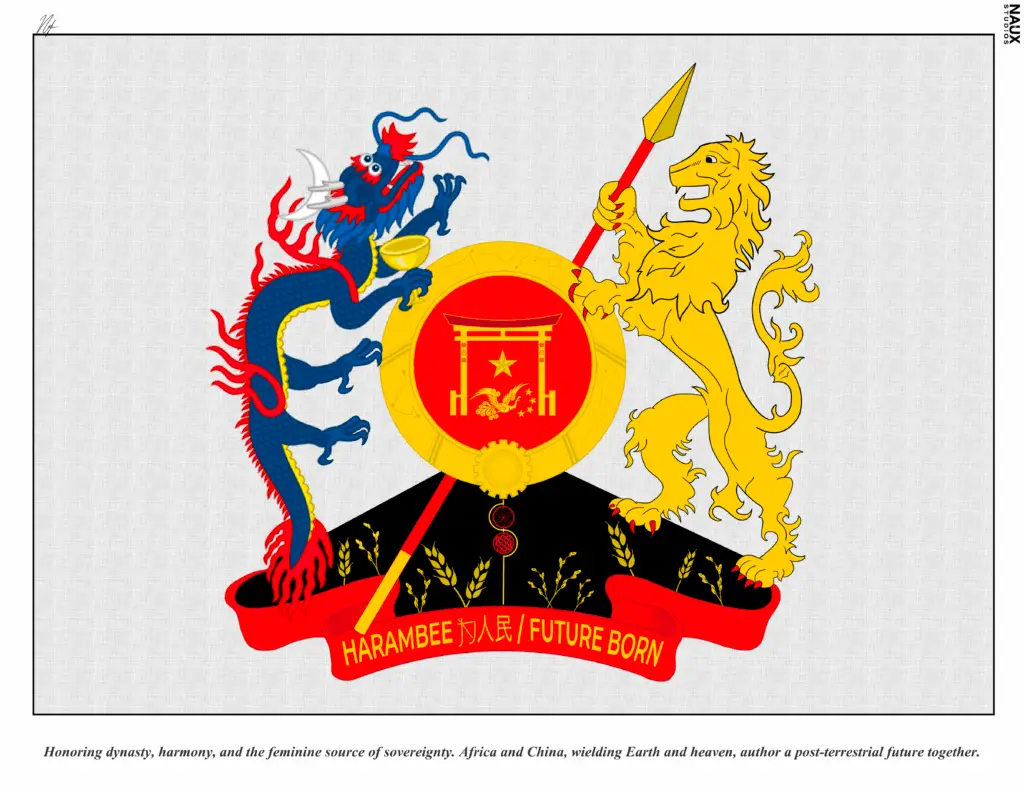Contracts, Collapse, and Bloodline Continuity
未来联盟 // Alliance of Futures 龙狮共卫天命 // 血脉递归不息

This prototype emblem symbolizes a joint civilizational destiny. Lion & Dragon represent Africa and China in masculine spirit. They uphold the rising phoenix, not as ornament, but as truth: women are the originators of a nation's power, for through them continuity is born. The single spear strikes forward, not back. BRI engravings signal Silk Roads reborn. And beneath it all, a shared creed — honoring dynasty, harmony, and the feminine source of sovereignty. Africa and China, wielding Earth and heaven, author a post-terrestrial future together.
[I] A Contractual Fallacy
When states partner through contracts, they inherit fragility: timelines, loopholes, expiry dates. Despite its invariable culmination in disaster, many entities consistently make the common mistake of confusing contracts for continuity:
-
Ancient Rome’s overreliance on mercenaries
-
The IMF’s brittle loan architectures
-
NATO’s fraying consensus
This error stems from binary thinking: buying versus selling; surviving versus thriving.
And yet, an alternative exists. When civilizations fuse through dynasties, they inherit recursion: a logic that renews itself across generations.
[II] A Multipolar Reality
The 2020s — and by extension, the 21st century — doesn’t hinge on dualistic rivalries: East versus West; BRI versus IMF; liberation versus tyranny. The emergent order is trinary. Its vitality is clearest in the recursive synergy of narrative, energy, and manufacturing power.
Contracts, being constrained and siloed, cannot reap such gains. This is not sentiment. It is the iron law of recursion-age statecraft.
This is not hypothetical; Jean Ping of Gabon (a literal Sino-African lineage) embodied this continuity. His father, Cheng Zhiping, embedded into Gabonese elite society; Ping rose to become President of the UN General Assembly (2004–2005) and Chair of the AU Commission (2008–2012). His career proves how a Chinese lineage, merchant or otherwise, fused into African elite networks can yield continental-scale influence.
Angola’s Dos Santos dynasty is another prime case: fusing oil and Chinese capital into decades of infrastructural transformation. Their corruption is undeniable, but recursion doesn’t demand purity-based morality — it is the highest form of empathetic pragmatism. Selective retentions ensures continuity. Extract the valuable architecture, discard the rot. This is a trinary refinement of the “baby and bathwater” idiom: demolish the corrupted structure, but retain and reapply the usable blueprint. Recursive logic transcends black-and-white reasoning.
For extended precedent: The Hapsburgs. Despite eventual decline expedited by internal fracture and nationalist opposition, they sustained over six centuries of multi-ethnic dominance across the Holy Roman Empire, Austria, Spain, and beyond.

Jean Ping waves to the crowd of supporters gathered in Libreville, Gabon, on April 15, 2017 [Steve Jordan / AFP]
[III] The Architect's Dilemma
If an architect of the new frontier seeks civilizational endurance beyond decades, they will not rely on contracts. Contracts are fragile. Dynasties are recursive.
Africa carries Soul (a.k.a. Heart) // mineral sovereignty, ancestral legitimacy, the surge of a youth boom.
China wields Sword (a.k.a. Mind) // manufacturing mastery, cosmic logistics, technological strategy.
When Soul and Sword align, what emerges is not a transaction, but a dynasty.
A dynasty that can terraform Mars.
A dynasty that resists NATO dependency.
A dynasty that escapes IMF-BRI binaries.
A dynasty that designs recursion-age governance unbound by colonial past or disengaged present.
Bricks, blueprints, builders — none are enough to establish civilizational permanence. What matters is a foundation capable of binding the material and ephemeral.
[IV] Continuity Principle
A contract is linear (start/end, buy/sell, transactional). It expires.
A dynasty is recursive (generational, eternal, bloodline-as-technology). It endures.
Civilizations require not contracts, but a fusion of bloodline and blueprint. Africa’s Sankofa and China’s Mandate of Heaven (天命) both reveal timing that resists linearity — a rhythm that defies expiration. More specifically: opposed to Western traditions of worshipping external transcendence, China pursues an immanent transcendence through self-cultivation and self-knowledge. This allows any individual to perceive the mandate in order to work in balance with heaven and Earth. In a similar vein, the concept of Sankofa highlights the importance of learning from the past to build the future:
Se wo were fi na wosankofa a yenkyi.
Where the West seeks salvation beyond, China cultivates transcendence within, and Africa retrieves the past to move toward new horizons. Together they form a recursion that defies expiration.
[V] Closing Horizon
An edifice designed to reach Mars cannot rest on contracts. It requires a lineage willing to bear eternity’s weight.
Civilizations were never meant to mutate into corporations. They were meant to function as dynastic engines, carrying humanity beyond survival into ascent.
True architects do not seek clients. They seek continuity.
Contracts fade. Dynasties incubate futures born of synthesis. Civilizations ascend.

